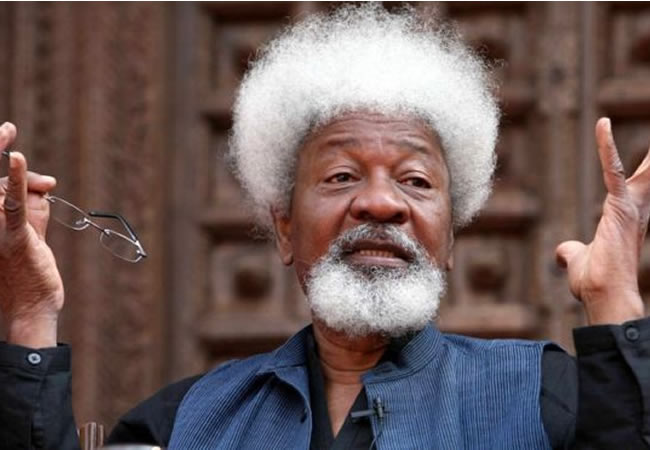
Contrary to former President Olusegun Obasanjo’s 2015 seriocomic commentary on Nobel Laureate Wole Soyinka (Kongi) as a man habitually hunting for guinea fowl and fine wine, the writer has lately revealed that his life isn’t all about wining and dining. Obasanjo (Obj) had said during a spat between them that he could always turn to Kongi if he wanted wine and guinea fowl. He said, “He (Soyinka) is surely a better wine connoisseur and a more successful aparo (guinea fowl) hunter than a political critic…If I want somebody to give me the best wine, one of the people I will go to is Wole Soyinka and I know he has a taste for good wine…”
He pictured the writer returning from an expedition with a blood-splattered bag slung over his shoulders and a heavy keg in one hand along with a gun he’d have used to take down big flying creatures for dinner, which would be washed down with frothy, fresh and fully fermented palm wine. There’s no record the man of letters obliged the man of the barracks this wish of a dish of bird meat and wine.
Now, nearly a decade after Obj’s outburst, Kongi is leading us into a new pastime of his: a search for the next Nigerian Nobel Laureate in Literature. He was the winner in 1986, the first African, opening the way for other writers on the continent: Naguib Mahfouz (Egypt, 1988), Nadine Gordimer (South Africa, 1991), John Coetzee (South Africa, 2003) and Abdulrazak Gurnah (Tanzania, 2021).
In the space of 12 years, two South Africans bagged the prize. So, Soyinka, wondering why a track a Nigerian charted hasn’t admitted another compatriot some 38 years after, says he’s on the quest for one. He is turning 90 on July 13, 2024. But looking beyond, he says he hopes that before his centennial anniversary, he’d take a trip to Stockholm, Sweden, the home of the prize jurors. There he wishes to “celebrate another Nigerian winning the Prize for Literature.” He told a TV station in Lagos recently: “…before I’m 100, I’ll be going to Stockholm to celebrate another Nigerian (Nobel Literature Laureate)…” He believes that the giant of Africa harbours “remarkable competitions between Nigerian writers, males and females and writers in the African continent.” Soyinka adds that “Nigeria is flooded with talents in the Arts… to win the Nobel Prize.”
For 2024, prize proposals have already been submitted to the Nobel Committees. On February 1, the six groups – one for each prize category, physics, chemistry, economics, physiology or medicine, literature and peace—started deliberations on nominations received, to complete their work and submit their recommendations to the Royal Swedish Academy of Sciences and the other prize-awarding institutions. The final decision are made by November 15, with the formal presentations to the winners taking place on December 10, five in Stockholm and peace prize in Oslo, Norway. December 10 is the anniversary of the death of Alfred Bernhard Nobel, the inventor and industrialist who bequeathed the annual project “to honour women and men for their outstanding achievements in chemistry, physics, physiology or medicine, literature, and work towards peace.” The Economics Prize was instituted in 1968 but awarded in 1969 to two persons “for having developed and applied dynamic models for the analysis of economic processes.”
The shroud of secrecy that attends the selection of Nobel winners would dwarf that of those nations whose scientists are furtively attempting to break into the planet’s small nuclear club. Our own Soyinka hasn’t given a hint he has sniffed a Nigerian winner the way he would a prey for meat a million miles away. But, naturally, as he told us in the TV interview, you’d always discern a pool from which to pull a winner.
He and the other legend, late Chinua Achebe, were there in the large ocean. Kongi got the award, beating hundreds of others and instantly lionising the world’s most populous black nation as we had never experienced it. Soyinka was quoted as saying that taxi drivers were part of the euphoria, celebrating the feat on our streets.
He wants an encore. Achebe, Africa’s greatest storyteller, would easily have stepped in; but the Nobel adjudicators bar posthumous recognition. From 1974, the Nobel Foundation moved that a prize cannot be given after death, although the prize can still be given if the honoree dies before receiving it. In 2011, there was a mixed reaction when the prize for Medicine went to a dead man, Ralph Steinman, because the judges weren’t aware of his death.
So, with his friend Achebe not at all in the scene, Soyinka has looked at the current crop of younger generation of writers to hazard an informed opinion that he’d yet witness a Nigerian with the Nobel garland by the time he’s 100 in July 2034. He mentions no name, though.
It’s contrary to what a writer for Euronews.culture did in 2022. Giulia Carbonaro projected a Nigerian among the favourites to win the Nobel Prize in Literature. Carbonaro said, “This year (2022) the names pushed forward for the Nobel Prize (in Literature) are hardly controversial. Among the favourites expected to win are beloved Japanese writer Haruki Murakami, Nigerian Chimamanda Ngozie Adichie and Indian-born British-American Salman Rushdie, who was recently the victim of a brutal knife attack at the hand of someone who had reportedly read only two pages of his novel, The Satanic Verses.”
None in Carbonaro’s list won it; the prize went to 82-year-old Annie Ernaux, the first Frenchwoman to bag it.
Given Soyinka’s prescient remarks over the possibility of another Nigerian making an entry into the Nobel pantheon within a decade, we can’t be less hopeful. Remember, Kongi has been there before. What he says about a terrain he’s familiar with must not be dismissed. He believes we’re ripe for another laureate. He has started the search early for that compatriot, following his own counsel to those who embark on a quest for a prize: Traveller, you must set out At dawn. And wipe your feet upon The dog-nose wetness of earth…Traveller you must set forth At dawn. I promise marvels of the holy hour…





